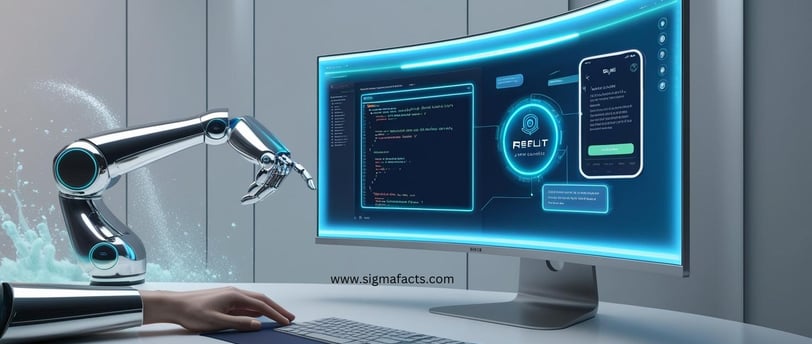
Replit Reveals Ultimate Agentic AI Definition!
Discover the future NOW! Dive into agentic AI—autonomous agents revolutionizing industries with real-time decisions. Unravel agentic ai meaning, definition & Replit AI innovation!
AITECHNOLOGY
Understanding Agentic AI
Agentic AI refers to artificial intelligence systems designed to operate autonomously—meaning they can make decisions, act on them, and adapt to changing environments without constant human oversight. This type of AI is often described as agentic artificial intelligence. It encapsulates the idea of intelligent or autonomous agents that observe their surroundings, learn from interactions, and adjust their behaviors to achieve specific goals. This marks a departure from traditional AI systems, which often rely on predefined rules or human interventions.
Agentic AI Definition and Meaning
Agentic AI Definition: This term describes AI systems that are self-directed and capable of autonomous decision-making. They use internal models and past experiences to navigate dynamic, unpredictable environments.
Agentic AI Meaning: Essentially, it means that these systems are no longer just passive algorithms. Instead, they actively interact with their environment to solve problems—adapting and evolving in real time. This proactive nature is what differentiates agentic AI from traditional, rule-based systems.
For instance, platforms like Replit are exploring the frontiers of replit agentic ai and agentic ai replit. On Replit—a collaborative coding platform—developers can experiment with autonomous agents that learn and act on code inputs, enhancing both the efficiency of coding tasks and the creativity behind automated problem-solving. By integrating such systems, Replit is paving the way for more interactive and self-sufficient AI applications.
Comparing Agentic AI with Other AI Types
Agentic AI vs Traditional AI
Traditional AI: Generally relies on predefined instructions and rule-based logic. These systems work best in controlled environments with clear, structured data.
Agentic AI: In contrast, focuses on autonomy and adaptability. It continuously learns from new inputs and modifies its behavior accordingly. This evolution means that agentic AI can operate effectively in uncertain and ever-changing scenarios, such as dynamic market conditions or real-time decision-making in autonomous vehicles.
Agentic AI vs Generative AI
Generative AI: Specializes in creating new content—from text and images to music—by learning patterns from extensive datasets. Tools like Generative Adversarial Networks (GANs) and transformers are typical examples.
Agentic AI: Prioritizes proactive decision-making over content creation. While generative AI’s strength lies in its ability to produce creative outputs, agentic AI is about strategy and action. This difference is pivotal when considering applications where real-time adaptation and strategic behavior are crucial.
Innovations Driving Agentic AI
Several key innovations are propelling the development of agentic AI:
1. Autonomous Decision-Making
Agentic AI systems are now capable of making split-second decisions without human intervention. This ability is vital in fields like finance (e.g., autonomous trading systems), healthcare, and logistics, where rapid responses can lead to significantly improved outcomes.
2. Dynamic Learning and Adaptation
Unlike their traditional counterparts, agentic AI systems continuously learn from new data. This enables them to adjust in real time, which is especially useful in environments that are inherently unpredictable, such as autonomous vehicles dealing with varying road conditions.
3. Integration with Emerging Technologies
The integration of agentic AI with Internet of Things (IoT) devices, edge computing, and other digital infrastructure leads to more interactive, responsive systems. This convergence is already being explored on platforms such as Replit, where experiments with agentic ai replit demonstrate how autonomous agents can manage and optimize diverse technological processes.
Future Trends and Investment Potential
Enhanced Interactivity and Integration
The future of agentic AI lies in creating systems that not only work independently but also integrate seamlessly with other digital technologies. For example, smart cities could benefit from autonomous agents that manage everything from traffic systems to energy distribution, continuously learning and adapting to residents’ needs.
Ethical and Regulatory Considerations
As these systems become more autonomous, addressing ethical and regulatory challenges will be critical. Ensuring transparency, accountability, and ethical decision-making in life-critical applications remains a significant focus for developers and policymakers alike.
Hybrid AI Systems
Future developments are likely to see the emergence of hybrid AI systems that combine the strengths of agentic AI, generative AI, and traditional AI. Such systems could leverage the creative output of generative models along with the decision-making prowess of agentic AI, leading to innovative solutions in fields like personalized medicine and automated design.
Investment Opportunities: Agentic AI Stocks
Investors are increasingly looking at companies pioneering in autonomous systems. The growth of agentic ai meaning and agentic ai definition as market differentiators has led to the emergence of agentic AI stocks. These investments are tied to firms that develop real-time decision-making platforms and adaptive learning algorithms, indicating a promising outlook for those interested in the next wave of technological innovation.
Conclusion
Agentic AI represents a transformative shift in how artificial intelligence is designed and applied. With its focus on autonomous decision-making and continuous learning, it goes beyond the capabilities of traditional rule-based systems. Platforms like Replit are already experimenting with replit agentic ai and agentic ai replit, demonstrating the potential of these technologies to revolutionize both the tech industry and the broader investment landscape.
Understanding the agentic ai definition and its practical implications is key to appreciating how these systems are poised to reshape industries—from autonomous vehicles and smart cities to finance and healthcare. As ethical frameworks and hybrid systems develop, the future of agentic artificial intelligence will likely bring about more responsible, integrated, and powerful AI-driven innovations.
By staying informed and investing in emerging trends, both technologists and investors can be part of the transformative journey that agentic AI is set to lead.



